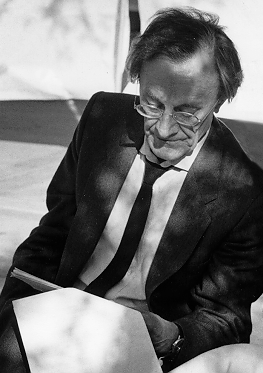<Back to Index>
- Philosopher and Literary Theorist Jean - François Lyotard, 1924
PAGE SPONSOR



Jean-François Lyotard (10 August 1924 – 21 April 1998) was a French philosopher and literary theorist. He is well known for his articulation of postmodernism after the late 1970s and the analysis of the impact of postmodernity on the human condition. He was co-founder of the International College of Philosophy with Jacques Derrida, François Châtelet and Gilles Deleuze.
He was born in 1924 in Versailles, France, to Jean - Pierre Lyotard, a sales representative, and Madeleine Cavalli. He went to primary school at the Paris Lycées Buffon and Louis - le - Grand and later began studying philosophy at the Sorbonne. His master's thesis, Indifference as an Ethical Concept, analyzed forms of indifference and detachment in Zen Buddhism, Stoicism, Taoism and Epicureanism. After graduation, in 1950, he took up a position teaching philosophy in Constantine in French East Algeria. Lyotard earned a Ph.D in literature with his dissertation, Discours, figure (published 1971). He married twice: in 1948 to Andrée May, with whom he had two children, Corinne and Laurence, and for a second time in 1993 to Dolores Djidzek, the mother of his son David (born in 1986).
In 1954 Lyotard became a member of Socialisme ou Barbarie, a French political organization formed in 1948 around the inadequacy of the Trotskyist analysis to explain the new forms of domination in the Soviet Union. His writings in this period mostly concern with ultra - left politics, with a focus on the Algerian situation - which he witnessed first hand while teaching philosophy in Constantine. Following disputes with Cornelius Castoriadis in 1964, Lyotard left Socialisme ou Barbarie for the newly formed splinter group Pouvoir Ouvrier, before resigning from Pouvoir Ouvrier in turn in 1966. Although Lyotard played an active part in the May 1968 uprisings, he distanced himself from revolutionary Marxism with his 1974 book Libidinal Economy.
In the early 1970s Lyotard began teaching at the University of Paris VIII, Vincennes, until 1987 when he became Professor Emeritus. During the next two decades he lectured outside of France, notably as a Professor of Critical Theory at the University of California, Irvine, and as visiting professor at universities around the world including Johns Hopkins, Berkeley, Yale and the University of California, San Diego, in the U.S., the Université de Montréal in Quebec (Canada), and the University of São Paulo in Brazil. He was also a founding director and council member of the Collège International de Philosophie, Paris. Before his death, he split his time between Paris and Atlanta, where he taught at Emory University as the Woodruff Professor of Philosophy and French.
Lyotard repeatedly returned to the notion of the Postmodern in essays gathered in English as The Postmodern Explained to Children, Toward the Postmodern and Postmodern Fables. In 1998, while preparing for a conference on Postmodernism and Media Theory, he died unexpectedly from a case of leukemia that had advanced rapidly. His work - in - progress, Augustine's Confession, was published posthumously in the same year. He is buried in Le Père Lachaise Cemetery in Paris.
Lyotard's work is characterized by a persistent opposition to universals, meta - narratives and generality. He is fiercely critical of many of the 'universalist' claims of the Enlightenment, and several of his works serve to undermine the fundamental principles that generate these broad claims.
In his writings of the early 1970s, he rejects what he regards as theological underpinnings of both Marx and Freud: "In Freud, it is judaical, critical somber (forgetful of the political); in Marx it is catholic. Hegelian, reconciliatory (...) in the one and in the other the relationship of the economic with meaning is blocked in the category of representation (...) Here a politics, there a therapeutics, in both cases a laical theology, on top of the arbitrariness and the roaming of forces". Consequently he rejected Adorno's negative dialectics which he regarded as seeking a "therapeutic resolution in the framework of a religion, here the religion of history". In Lyotard's "libidinal economics" (the title of one of his books of that time), he aimed at "discovering and describing different social modes of investment of libidinal intensities".
Most famously, in La Condition postmoderne: Rapport sur le savoir (The Postmodern Condition: A Report on Knowledge) (1979), he proposes what he calls an extreme simplification of the "postmodern" as an 'incredulity towards meta - narratives'. These meta - narratives - sometimes 'grand narratives' - are grand, large scale theories and philosophies of the world, such as the progress of history, the knowability of everything by science, and the possibility of absolute freedom. Lyotard argues that we have ceased to believe that narratives of this kind are adequate to represent and contain us all. We have become alert to difference, diversity, the incompatibility of our aspirations, beliefs and desires, and for that reason postmodernity is characterized by an abundance of micronarratives. For this concept Lyotard draws from the notion of 'language - games' found in the work of Wittgenstein.
In Lyotard's works, the term 'language games', sometimes also called 'phrase regimens', denotes the multiplicity of communities of meaning, the innumerable and incommensurable separate systems in which meanings are produced and rules for their circulation are created.
This becomes more crucial in Au juste: Conversations (Just Gaming) (1979) and Le Différend (The Differend) (1983), which develop a postmodern theory of justice. It might appear that the atomization of human beings implied by the notion of the micronarrative and the language game suggests a collapse of ethics. It has often been thought that universality is a condition for something to be a properly ethical statement: 'thou shalt not steal' is an ethical statement in a way that 'thou shalt not steal from Margaret' is not. The latter is too particular to be an ethical statement (what's so special about Margaret?); it is only ethical if it rests on a universal statement ('thou shalt not steal from anyone'). But universals are impermissible in a world that has lost faith in metanarratives, and so it would seem that ethics is impossible. Justice and injustice can only be terms within language games, and the universality of ethics is out of the window. Lyotard argues that notions of justice and injustice do in fact remain in postmodernism. The new definition of injustice is indeed to use the language rules from one 'phrase regimen' and apply them to another. Ethical behavior is about remaining alert precisely to the threat of this injustice, about paying attention to things in their particularity and not enclosing them within abstract conceptuality. One must bear witness to the 'differend.'
"I would like to call a differend the case where the plaintiff is divested of the means to argue and becomes for that reason a victim. If the addressor, the addressee, and the sense of the testimony are neutralized, everything takes place as if there were no damages. A case of differend between two parties takes place when the regulation of the conflict that opposes them is done in the idiom of one of the parties while the wrong suffered by the other is not signified in that idiom."
Lyotard was a frequent writer on aesthetic matters. He was, despite his reputation as a postmodernist, a great promoter of modernist art. Lyotard saw 'postmodernism' as a latent tendency within thought throughout time and not a narrowly limited historical period. He favored the startling and perplexing works of the high modernist avant garde. In them he found a demonstration of the limits of our conceptuality, a valuable lesson for anyone too imbued with Enlightenment confidence. Lyotard has written extensively also on few contemporary artists of his choice: Valerio Adami, Daniel Buren, Marcel Duchamp, Bracha Ettinger and Barnett Newman, as well as on Paul Cézanne and Wassily Kandinsky.
He developed these themes in particular by discussing the sublime. The "sublime" is a term in aesthetics whose fortunes revived under postmodernism after a century or more of neglect. It refers to the experience of pleasurable anxiety that we experience when confronting wild and threatening sights like, for example, a massive craggy mountain, black against the sky, looming terrifyingly in our vision.
Lyotard found particularly interesting the explanation of the sublime offered by Immanuel Kant in his Critique of Judgment (sometimes Critique of the Power of Judgment). In this book Kant explains this mixture of anxiety and pleasure in the following terms: there are two kinds of 'sublime' experience. In the 'mathematically' sublime, an object strikes the mind in such a way that we find ourselves unable to take it in as a whole. More precisely, we experience a clash between our reason (which tells us that all objects are finite) and the imagination (the aspect of the mind that organizes what we see, and which sees an object incalculably larger than ourselves, and feels infinite). In the 'dynamically' sublime, the mind recoils at an object so immeasurably more powerful than we, whose weight, force, scale could crush us without the remotest hope of our being able to resist it. (Kant stresses that if we are in actual danger, our feeling of anxiety is very different from that of a sublime feeling. The sublime is an aesthetic experience, not a practical feeling of personal danger.) This explains the feeling of anxiety.
What is deeply unsettling about the mathematically sublime is that the mental faculties that present visual perceptions to the mind are inadequate to the concept corresponding to it; in other words, what we are able to make ourselves see cannot fully match up to what we know is there. We know it's a mountain but we cannot take the whole thing into our perception. Our sensibility is incapable of coping with such sights, but our reason can assert the finitude of the presentation. With the dynamically sublime, our sense of physical danger should prompt an awareness that we are not just physical material beings, but moral and (in Kant's terms) noumenal beings as well. The body may be dwarfed by its power but our reason need not be. This explains, in both cases, why the sublime is an experience of pleasure as well as pain.
Lyotard is fascinated by this admission, from one of the philosophical architects of the Enlightenment, that the mind cannot always organize the world rationally. Some objects are simply incapable of being brought neatly under concepts. For Lyotard, in Lessons on the Analytic of the Sublime, but drawing on his argument in The Differend, this is a good thing. Such generalities as 'concepts' fail to pay proper attention to the particularity of things. What happens in the sublime is a crisis where we realize the inadequacy of the imagination and reason to each other. What we are witnessing, says Lyotard, is actually the differend; the straining of the mind at the edges of itself and at the edges of its conceptuality.
Some argue that Lyotard's theories may seem self - contradictory because The Postmodern Condition seems to offer its own grand narrative in the story of the decline of the metanarrative. Against this it can be argued that Lyotard's narrative in The Postmodern Condition declares the decline of only a few defunct "narratives of legitimation" and not of narrative knowledge itself. It is not logically contradictory to say that a statement about narratives is itself a narrative, just as when Lyotard states that "every utterance [in a language game] should be thought of as a 'move' in a game" his statement is itself a 'move' in a language game.
See also the critical analysis of David Harvey in his book The Condition of Postmodernity (1989). As a materialist, Harvey finds traits of postmodernity to be rooted in the large scale shifts from Fordist to flexible accumulation through a period of pronounced 'time - space compression', taking place in conjunction with the technological advances happening roughly around the 1970s.
The collective tribute to Lyotard following his death was organized by the Collège International de Philosophie, and chaired by Dolores Lyotard and Jean - Claude Milner, the College's director at that time. The proceedings were published by PUF in 2001 under the general title Jean - François Lyotard, l'exercice du différend.
To mark the tenth anniversary of Lyotard's death, An international symposium about Jean - François Lyotard organized by the Collège International de Philosophie (under the direction of Dolores Lyotard, Jean - Claude Milner and Gerald Sfez) was held in Paris on January 25 - 27, 2007.